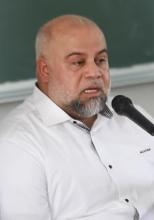Issue:
September 2025 | Gaza Media Special Report Part II
David McNeill speaks to Wael Al-Dahdouh, Palestinian journalist and bureau chief of Al Jazeera in Gaza City

What has been happening in Gaza has served as a real, critical, and serious test for all media outlets. Unfortunately, many media organizations have failed this test resoundingly in their coverage of these events, this genocide, and these humanitarian tragedies. Even now, many outlets have yet to adapt their editorial policies or approaches to reflect the exceptional reality and scale of what is happening. Many, for instance, have broadcast the Israeli narrative in full from the outset, without bothering to verify its claims or consider the Palestinian account, which is represented by evidence, images, numbers, and facts on the ground that must be reported and highlighted.
There is a people being annihilated and uprooted, mass displacement, the destruction of homes over the heads of their residents, attacks on hospitals and shelters, on doctors, and a massacre of journalists and paramedics, among others. When a journalist is killed, we still see much of the global media simply accepting the Israeli narrative. We have witnessed Israel’s tactics in this regard: every time journalists are clearly targeted and killed or wounded, unfounded accusations are quickly made, often serving as a pretext for these attacks.
As revealed by an investigative journalist, there is a special Israeli intelligence unit whose purpose is to look for justifications and excuses for targeting and killing innocent journalists. Sadly, many media outlets accept these Israeli claims, despite the blood that has been shed.
One recent incident involved six colleagues who were targeted in one strike at a well-known and clearly-marked press tent, in the middle of a group of journalists’ tents on a street near Al-Shifa Hospital in Gaza City. The tent was struck by a missile, and the Israeli army claimed responsibility. Regrettably, some media outlets adopted the Israeli narrative, labeling our colleague Anas as a “terrorist in disguise”.
This is a clear example of double standards; when a journalist is killed in places like Ukraine, the entire world - leaders, governments, media, and public opinion – rises in outrage over the targeting of a single journalist.
We oppose the targeting of journalists anywhere in the world, not just in Gaza. That is why we call on our colleagues in the media to take a stand. Since the beginning of this war and this genocide, we have fulfilled our duty independently and objectively. We are not a party to this conflict; rather, we have carried out our work professionally, impartially, and with the utmost integrity. The inclination of some media outlets toward the Israeli narrative is as painful and devastating for us as the physical attacks themselves – sometimes even more so.
Recently, we have seen some shifts in media coverage, but this is more of a response to the overwhelming scale of human suffering, war crimes, famine, images of children, and the immense destruction and siege, rather than a genuine editorial transformation. Nevertheless, this change remains insufficient compared to the magnitude of the humanitarian catastrophe and the ongoing genocide in Gaza.
For all these reasons, we call on our colleagues in the media to stand in solidarity with their peers in Gaza, who are facing famine, and to do justice to the victims by engaging with what is happening in Gaza as the exceptional event that it is.
David McNeill is professor of communications and English at University of the Sacred Heart in Tokyo, and co-chair of the FCCJ’s Professional Activities Committee. He was previously a correspondent for the Independent, the Economist and the Chronicle of Higher Education.

